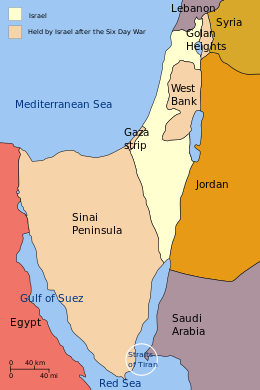The Six Day War
| Six-Day War | |||||||||
|---|---|---|---|---|---|---|---|---|---|
| Part of the Arab–Israeli conflict | |||||||||
 Territory held by Israel before and after the Six Day War. The Straits of Tiran are circled, between the Gulf of Aqaba to the north and the Red Sea to the south. |
|||||||||
|
|||||||||
| Belligerents | |||||||||
|
Supported by: |
|||||||||
| Commanders and leaders | |||||||||
|
|
|
||||||||
| Strength | |||||||||
|
50,000 troops 100,000 deployed |
Egypt: 240,000 240,000 deployed |
||||||||
| Casualties and losses | |||||||||
| 776–983 killed 4,517 wounded 15 captured 400 tanks destroyed 46 aircraft destroyed |
Egypt: 10,000–15,000 killed or missing 4,338 captured Jordan: 6,000 killed or missing 533 captured Syria: 2,500 killed 591 captured Iraq: 10 killed 30 wounded Lebanon: One aircraft lost Hundreds of tanks destroyed 452+ aircraft destroyed |
||||||||
| 20 Israeli civilians killed 34 US Navy sailors killed |
|||||||||
50,000 troops
214,000 reserves
300 combat aircraft
800 tanks
Egypt: 240,000
Syria, Jordan, and Iraq: 307,000
957 combat aircraft
2,504 tanks
Lebanon: 2 combat aircraft
The Six-Day War (Hebrew: מלחמת ששת הימים, Milhemet Sheshet Ha Yamim; Arabic: النكسة, an-Naksah, "The Setback" or حرب ۱۹٦۷, Ḥarb 1967, "War of 1967"), also known as the June War, 1967 Arab–Israeli War, or Third Arab–Israeli War, was fought between June 5 and 10, 1967 by Israel and the neighboring states of Egypt (known at the time as the United Arab Republic), Jordan, and Syria.
Relations between Israel and its neighbours had never fully normalised following the 1948 Arab–Israeli War. In the period leading up to June 1967, tensions became dangerously heightened. In reaction to the mobilisation of Egyptian forces along the Israeli border in the Sinai Peninsula, Israel launched a series of preemptive airstrikes against Egyptian airfields. The Egyptians were caught by surprise, and nearly the entire Egyptian air force was destroyed with few Israeli losses, giving the Israelis air superiority. Simultaneously, the Israelis launched a ground offensive into the Gaza Strip and the Sinai, which again caught the Egyptians by surprise. After some initial resistance, Egyptian leader Gamal Abdel Nasser ordered the evacuation of the Sinai. Israeli forces rushed westward in pursuit of the Egyptians, inflicted heavy losses, and conquered the Sinai.
Nasser induced Syria and Jordan to begin attacks on Israel by using the initially confused situation to claim that Egypt had defeated the Israeli air strike. Israeli counterattacks resulted in the seizure of East Jerusalem as well as the West Bank from the Jordanians, while Israel's retaliation against Syria resulted in its occupation of the Golan Heights.
...
Wikipedia
